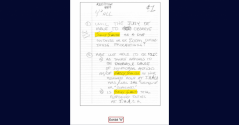The motion states that Juror #1's wife shared "insider information" about the trial on social media. The information she shared could only have been obtained from her husband (Juror #1). The information was shared during the trial.
Wow, that's a clear violation. What was the jury foreman thinking? Had he never served on a jury before? Did he think it was ok to ignore the rules?
"...that's a clear violation" -- That's only a violation if it happened. However, what the motion "states" is merely a claim (or an opinion) about what they think (or want the court to think) has happened. Don't assume that what is written in a motion is just a recitation of facts, because they can be filled with total fiction (or deceptive half-truths), as well as with arguments that are completely irrational.
I read this motion. It is lengthy. I certainly didn't memorize it or analyze it in great detail, but my observation was that it was a long list of suppositions and speculation leading to lots of opinion or claims, and yet nothing I saw was an objective fact proving the Lengyels indeed discussed the case.
Overall, it seemed to me that their main "proof" was the fact that they were husband and wife living together, so therefore they MUST HAVE discussed the case, and anything that was said or opined or noticed by either
must have come from a discussion of the case. But when they used that supposition ("they must have discussed the case") as the main "fact" to prove their point ("so they discussed the case"), it's a circular argument, and proves nothing.
Some of their arguments were about how Mrs L predicted accurately what would happen next in the courtroom, and this (supposedly) proved she had been talking to her juror husband -- which is silly nonsense, since Juror Husband didn't control what happened next. And don't we, in this forum as a trial unfolds, offer guesses of what's ahead that can prove true? Aren't some of the guesses (and guessers) helpful and on track at times? Are we talking to jurors about the case? Their claims seem to be absurd.
Another oft-repeated argument they used was based on the idea that Mrs L should have been impartial in what she said online in the trial, so she stepped out of line. C'mon, that's just wrong. She was not the juror. Yet the defense claims she stepped over the line by her opinions. Seems like more nonsense to me.
Furthermore, they say JH must have been unfairly influenced by Mrs L's anti-defense opinions, 'since obviously they were discussing the case' (assuming the idea they are claiming to prove). Again, just circular assumptions.
One more important thing to note - the court already had this issue raised during the trial, and it led nowhere. Isn't the defense just wishfully re-fishing the same dry hole?
I'm not sure this level of wild supposition even leads to a hearing. I sure didn't see anything persuasive in their novel. But it's the courts call, not mine.
Just my 2c.
 acrobat.adobe.com
acrobat.adobe.com






